
Higher food costs can affect nutrition and health: researchers Rising grocery prices affect food choices and nutrition, and ultimately health, say health behaviour researchers Sarah Woodruff, Paige Coyne, and Sheldon Fetter. Photo courtesy: https://www.pexels.com/photo/grocery-store-264636/ When inflation takes a bite out of grocery budgets, wider consequences follow, say a trio of health behaviour researchers from the Faculty of Human Kinetics. In an article published in The Conversation, kinesiology professor Sarah Woodruff, doctoral candidate Paige Coyne, and doctoral student Sheldon Fetter discuss how rising grocery prices affect food choices, nutrition, health, and even the health-care system. “We believe that many Canadians will undoubtedly feel the additional financial pressure at the checkout line, and many will eat less nutritious and cheaper food options.” They point to research that shows increased household food insecurity is strongly associated with greater strain on the health-care system. People visit doctors and emergency rooms…
CBC Radio Interview : St. Clair College receives $720,000 to tackle youth homelessness and school nutrition CBC Windsor Morning Host Nav Nanwa interviews St. Clair College professor Kyle Jackson about a $720,000 social innovation grant to tackle youth homelessness and school nutrition in Windsor-Essex. Listen here. Learn more here.
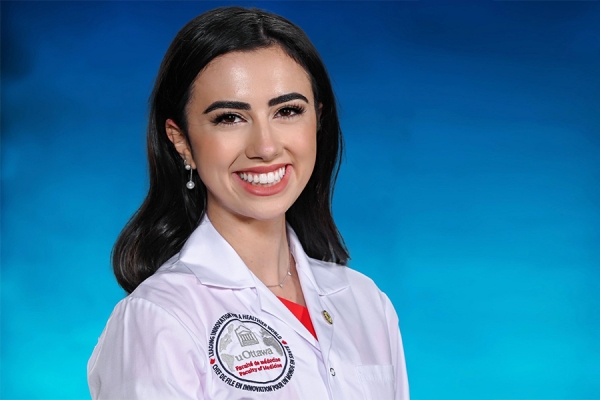
Science grads win recognition for academic and community leadership Athena scholar Aliyah King is studying medicine at the University of Ottawa. Two former Faculty of Science students were recognized by the Athena Scholarship Program which maintains that by elevating people with potential and solid values, they will be exceptional role models and inspire others to achieve excellence. The Athena Scholarship Fund Windsor provides scholarships to post-secondary students who excel academically, exhibit extensive community involvement, and serve as outstanding leaders while assisting girls and women to achieve a better quality of life and reach their full potential as leaders. Aliyah King (BA 2022) completed three years of the behaviour, cognition, and neuroscience program in the Faculty of Science at the University of Windsor before entering her current studies in the doctor of medicine program at the University of Ottawa. “Because of Science at UWindsor, I have met many mentors who have helped me develop life skills both in and outside of the academic environment,”…
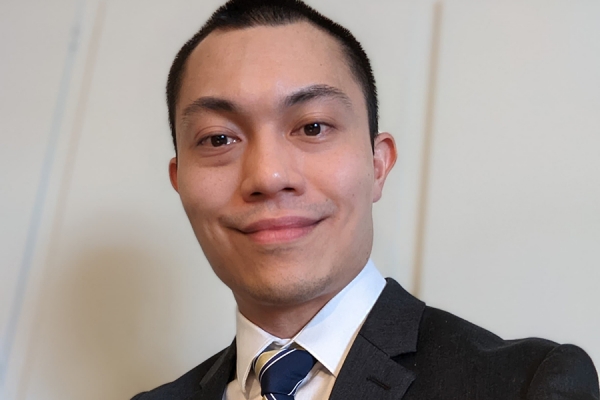
Grad a senior scientist investigating drugs to treat cancer Alumnus Dennis Ma credits his UWindsor education with preparing him for his career researching drugs to treat cancer. Science alumnus Dennis Ma (BSc 2010, PhD 2016) will start in 2023 with a new role as a senior scientist at Calico Life Sciences, a company focused on longevity, aging, and diseases related to aging. “I will be focusing on cancer drug discovery and studying cellular mechanisms driving metastasis, the spread of cancers from a primary tumour to secondary sites in the body,” says Dr. Ma. “Metastasis is one of the leading causes of cancer related deaths, so it is my goal to leverage my discoveries to drive the design of new and effective therapeutics for metastatic cancers.” The former Vanier Canada Graduate Scholar received his doctorate in the Department of Chemistry and Biochemistry under the supervision of professor Siyaram Pandey. “Because of Science at UWindsor I’ve had extensive training in cancer drug discovery and testing during my PhD with Dr. Pandey,”…
January networking event to bring together health research community WE-SPARK continues to host their monthly networking series in 2023. These events focus on networking by providing a casual forum to bring together the Windsor-Essex health research community. The evening does not have an official agenda, no rsvp is required, and all are welcome. This is an opportunity for anyone interested in health research to make connections in an informal and enjoyable atmosphere. The next event will be held Thursday January 5th , 5-8pm at Bourbon Tap & Grill, 1199 Ottawa St, Windsor.
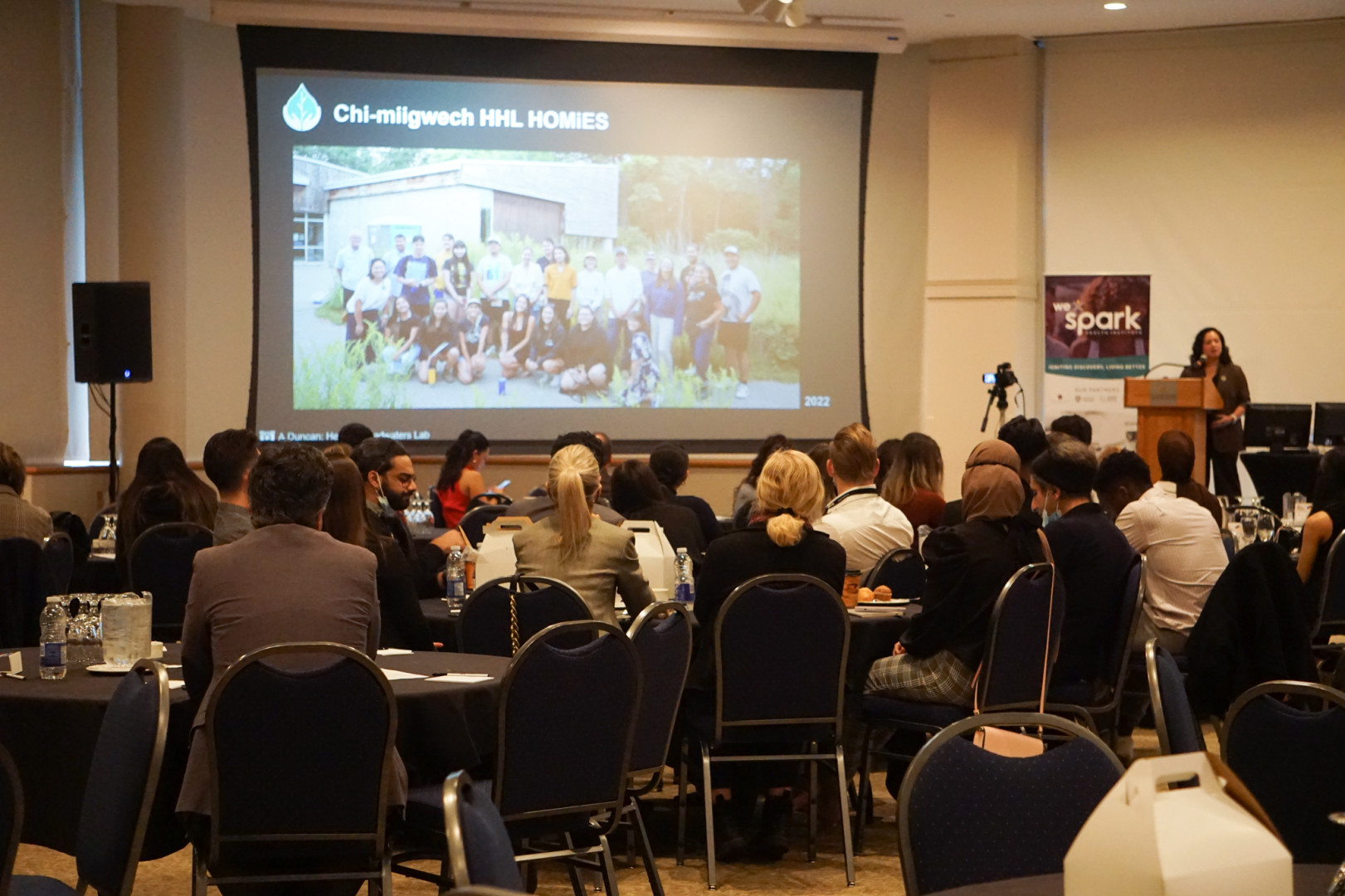
Awards recognize collaboration in health research Ryan Palazzolo, WE-Spark Health Institute student network co-ordinator (centre), accepts an award for dedication to advancing its vision from executive director Lisa Porter and assistant director Karen Metcalfe. WE-SPARK Health Institute awarded 18 students for their poster presentations during its International Research Conference in November. The undergraduate, graduate, PhD, and medical students were awarded $1,400. The innovative projects were wide-ranging across a variety of disciplines and included addressing child literacy gaps in vulnerable populations, preventing the spread of COVID-19 through education, exploring barriers to young adults seeking mental health supports, cancer research projects, and more. For the complete list of projects and names of the students and their collaborators, click here. “It’s so important that students are given local opportunities to present their work,” said biomedical sciences professor Lisa Porter, executive director of WE-Spark. “Telling…
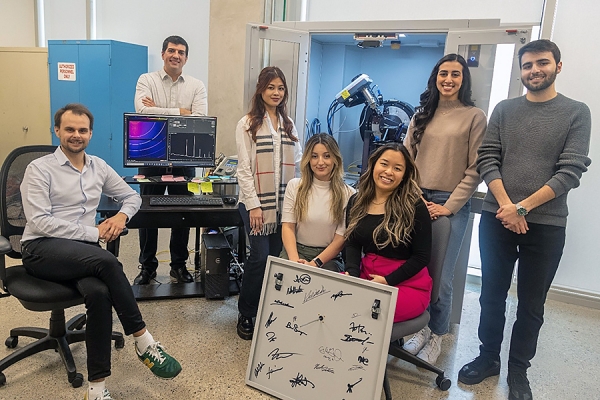
Industrial partnership yields big gains for Windsor-Essex and University of Windsor Members of chemistry professor Nick Vukotic’s research group pose with an instrument panel signed by Proto and UWindsor staff involved in the build (from left): Anton Dmitrienko, Dr. Vukotic, Michelle Dao, Melissa Berberi, Madeleine Chang, Joy-Lynn Kobti, and Ali Baranbo. An industrial partnership between Proto Manufacturing and the University of Windsor has resulted in the development of a cutting-edge scientific instrument for the discovery of new solid materials. The system uses X-rays to rapidly test small amounts of materials, such as pharmaceuticals, chemicals, minerals, and nanomaterials. The team, spearheaded by chemistry and biochemistry professor Nick Vukotic, filed a provisional patent around the design of a new instrument in early 2022. “The partnership we have with Proto is truly unique in that it has both a local and global impact,” says Dr. Vukotic. “Locally, it enhances the research capabilities of the University, creates jobs, and provides an excellent training…
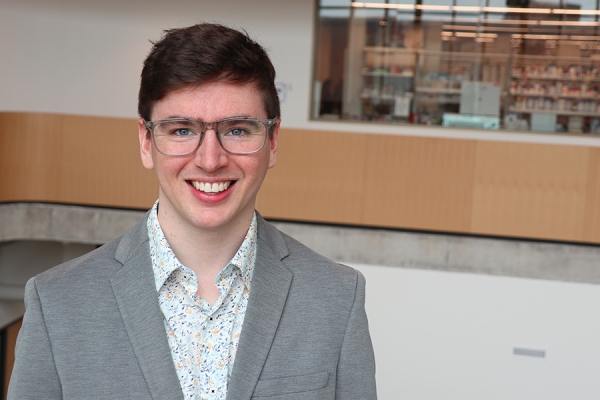
Leadership and research skills earn national award for chemistry student Joseph Zurakowski, a doctoral student of chemistry, has won a Vanier Canada Graduate Scholarship. Synthetic chemist Joseph Zurakowski has won a Vanier Canada Graduate Scholarship. As a Vanier Scholar, the doctoral student has demonstrated leadership skills and a high standard of scholarly achievement in graduate studies. These awards are competitive — this is the first to be awarded to a UWindsor Faculty of Science student in over 10 years, and Fallon Mitchell is the first-ever recipient in the Faculty of Human Kinetics (see related story). “I’m completely floored and incredibly grateful,” says Zurakowski. “I believe it takes a city to raise a person and between my family, my partner, and my supervisors, this news is incredible.” The Government of Canada launched the Vanier scholarship program in 2008 to strengthen the country’s ability to attract and retain world-class doctoral students and establish Canada as a global centre of excellence in research and higher learning.…
Networking event to bring together health research community WE-SPARK Health Institute hosts monthly networking events for members of the Windsor-Essex health research community to get to know one another through fun and casual conversations. There is no formal agenda, and all are welcome. This is an opportunity for anyone interested in health research to make connections in an informal and enjoyable atmosphere. The next event will be held Thursday December 1st, 5-8pm at Bourbon Tap & Grill, 1199 Ottawa St, Windsor. No RSVP is required. WE-SPARK Health Institute is a partnership of Erie Shores HealthCare, Hôtel-Dieu Grace Healthcare, St. Clair College, the University of Windsor and Windsor Regional Hospital designed to take healthcare outcomes to the next level through research.











